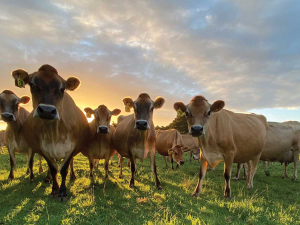From Sky Tower to cowshed
Every morning dairy farmer Sam Waugh sees the Auckland Sky Tower through his window. It's a great reminder of one of his key life goals - giving young people from towns and cities insights into farm life.
 The field day will showcase how Jersey cows provide the perfect balance between efficiency, sustainability, and adaptability.
The field day will showcase how Jersey cows provide the perfect balance between efficiency, sustainability, and adaptability.
The future of sustainable, profitable and environmentally friendly dairying will be on full display at the upcoming 'The Right Balance' field day at NZ Young Farmers' Donald Farm in South Auckland.
Hosted by JerseyNZ and Jersey Advantage, this event, on Thursday April 3, will showcase how Jersey cows provide a good balance between efficiency, sustainability and adaptability, assisting farmers to maximise profitability while reducing environmental impacts.
Dairy farmers across New Zealand are looking for solutions that offer higher productivity without compromising environmental responsibility. Jersey NZ says Jerseys are leading the way, offering more milk solids per unit of feed, superior fertility, and a smaller environmental footprint.
"If you're interested in optimising your herd for the future, this is an event you won't want to miss," it says.
"New Zealand's dairy industry is facing increasing challenges, one of which is rising environmental regulations.
"The Jersey breed presents an opportunity for farmers to futureproof their operations with cows that are more efficient, more profitable and better for the land."
For Dave and Lea Moodie from Morrinsville, the evidence was clear.
"With their higher breeding worth, means greater efficiency and environmental impact, such as less production of greenhouse gas and urinary nitrogens," says Jersey NZ.
It says research shows that Jerseys require less feed to produce the same amount of milksolids as other breeds. They also have a lower replacement rate because of their strong fertility, superior udder health and reduced lameness issues. As a result, farmers are not only seeing greater profitability but also achieving more sustainable and environmentally friendly farming systems, according to JNZ.
It claims that Jerseys produce 8% more milk solids per unit of feed compared to Holstein Friesians.
"This means that for every kilogram of dry matter eaten, Jerseys return more valuable milk solids, increasing farm profitability.
"Jerseys are considerably lighter than other breeds, putting less pressure on pasture and reducing soil compaction. Their gentle nature makes them easier to handle, an important consideration for farm staff and lifestyle balance.
"Additionally, Jerseys have a natural advantage in warm climates, thanks to their lighter coats and increased heat tolerance. This allows them to maintain better production levels in hotter conditions, especially as climate conditions become more unpredictable."
With many farmers transitioning to once-a-day (OAD) milking, having cows that can maintain productivity under different milking systems is crucial.
According to Jersey NZ, Jerseys excell in this area, with higher milk solids concentration and better udder conformation, reducing the risk of udder breakdown and culling.
It says that studies show that the milk production drop for Jerseys shifting to OAD is significantly lower than for Holstein Friesians - by up to 9% less decline. Research by Massey University found that an OAD milking system reduces milk production per cow but improves fertility and quality of life for the farmer, it says.
Event Details
Donald Trump's latest tariff tantrum has again thrown the world of trade into a new round of turmoil and uncertainty, and NZ is caught up in it.
The third edition of the NZ Dairy Expo, held in mid-February in Matamata, has shown that the KISS principle (keep it simple stupid) was getting a positive response from exhibitors and visitors alike.
Twenty years ago, South African dairy farm manager Louis Vandenberg was sent to a farm in Waikato to provide training on Afimilk technology.
Strong farmgate milk price is helping boost investment on farms, says PGG Wrightson chief executive Stephen Guerin.
Fonterra's 460 milk suppliers in Australia, who will switch to Lactalis end of this month, are unfazed with the impending change.
The 5+ A Day Charitable Trust has launched a collection of affordable recipes designed to turn everyday vegetables into seasonal stars.
OPINION: Is it a case of over promising and under delivering? Farmers think so.
OPINION: The UK dairy industry is celebrating a win after plant-based drink maker Oatly lost a long-running legal battle over…